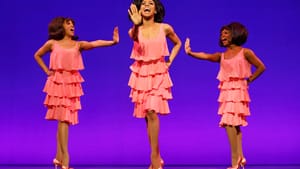Stay in the Loop
BSR publishes on a weekly schedule, with an email newsletter every Wednesday and Thursday morning. There’s no paywall, and subscribing is always free.
A musical buffet
'Motown the Musical'

Motown the Musical treats us to almost 60 songs from the Motown catalog, along with three new ones by Berry Gordy and Michael Lovesmith. Motown, which has become synonymous with the songs we sing in the shower and the music that was playing when we met “the one," was founded by Gordy in 1959.
With an $800 loan from his family, Gordy, a former boxer and auto worker, opened his first office in a small Detroit house under the aspirational and prophetic sign Hitsville, U.S.A. The company still exists today, although it has shaken off its motor city roots and been taken over by a succession of corporate entities, but it is most associated with the early stars whose names we all know — Diana Ross, Smokey Robinson, Stevie Wonder, and Michael Jackson, to name just a few.
Motown the Musical charts the course of Gordy’s rise and fall and rise and so on during the first 25 years of the company, but it stays on the surface. Comparing it to the other jukebox musicals like We Will Rock You, which posited a dystopian future in which the government controlled music (all of it originally performed by Queen), and Jersey Boys, which followed the ups and downs of Frankie Valli and the Four Seasons (in particular, Valli’s financial and personal woes), Motown seems mainly interested in showcasing the music and using the story as a timeline rather than as a narrative.
Nothing personal
The problem is that Gordy was part of the creative team that put the musical together. It serves as a celebration of Motown but carefully avoids any personal revelation. While it showcases the romance between Gordy and Diana Ross (Allison Semmes) and their eventual breakup, it doesn’t go deep into the problems that drove them apart.
Nor does it tell us much about how Motown came to be Motown. A few throwaway lines about bringing in a fashion consultant and teaching the performers how to behave let us know that the artists were groomed to a certain standard, but it might have been fun to watch as they struggled to create the choreography that is as much a part of the performances as the music. Having managed beginning singers, I know that it takes a lot to hone a performance, and other than finding the right song for the “No Hit Supremes,” there is no sense of how artists were developed within the company. What is still relevant were the challenges Gordy faced in bringing “black music” to a white audience — for which he used a purely white salesforce.
The first act mostly piles up the victories, along with a few challenges, against a backdrop of the events of the times. Martin Luther King Jr. and JFK’s assassinations serve as reminders that the music did not exist in a vacuum. When Marvin Gaye (Jarran Muse) wants to respond to the Vietnam War with “Mercy Mercy Me,” Gordy resists, although he eventually gives in.
Singing along
The second act focuses a bit more on Gordy’s relationship with Diana Ross as well as the departure of the original Motown singers and the search for replacements. In this act, the music settles down and lets the audience join in. When Diana steps out into the audience and everyone sings along to “Reach Out and Touch,” the show comes alive. The audience participates, hands raised, swaying to the music. It’s what we’d been wanting to do all along.
The performances are vocally strong and reminiscent of the original performers, but because all the songs were truncated, there was no chance for the audience to get engaged. And then the show ended with one of the new songs, "Can I Close the Door," instead of letting everyone join in with something we all knew.
But perhaps I’m quibbling. Truth is, if you love Motown music, (and who doesn’t?), you’ll have fun at Motown the Musical, even if you’re longing for a little more substance to go along with a very sweet treat.
What, When, Where
Motown the Musical, produced by Kevin McCollum, Doug Morris, and Berry Gordy. Charles Randolph-Wright directed. Book by Berry Gordy. Arrangements and orchestrations by Ethan Popp, additional arrangements by Bryan Crook, and dance arrangements by Zane Mark. Through January 18, 2015 at Academy of Music, Broad and Locust Sts., Philadelphia. 215-893-1999 or www.kimmelcenter.org.
Sign up for our newsletter
All of the week's new articles, all in one place. Sign up for the free weekly BSR newsletters, and don't miss a conversation.

 Naomi Orwin
Naomi Orwin